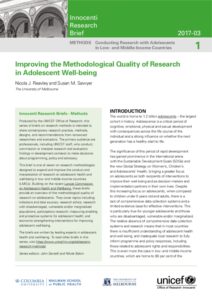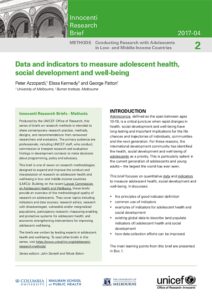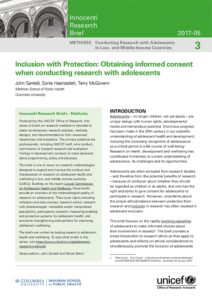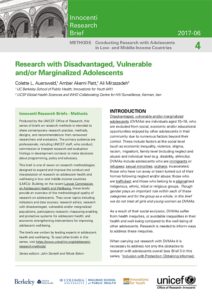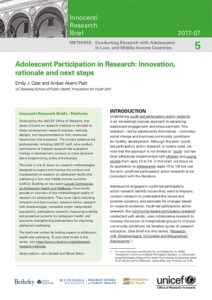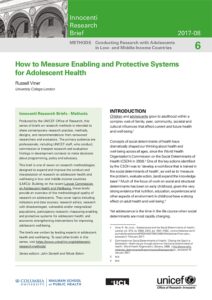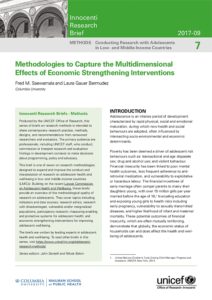Adolescent research briefs
The world is home to 1.2 billion adolescents (10-19 years): the largest cohort of this age-group in history. Adolescence is a critical period of cognitive, emotional, physical and sexual development with consequences that stretch far into adulthood. The period also provides a second “window of opportunity” to build on early investments, promote positive behaviours, and offer a second chance to those who fared less well in early childhood.
90 per cent of adolescents live in low- and middle-income countries. Despite an increasing focus on their wellbeing, comprehensive data collection systems and research for effective interventions are lacking. This is particularly true for younger and disadvantaged adolescents.
Developed by UNICEF Office of Research – Innocenti with Columbia University and experts from the 2016 Lancet Commission, this series of research briefs provides a much needed review of contemporary research methodologies for adolescent wellbeing in low- and middle-income countries, covering: indicators and data sources, ethics, research with disadvantaged and vulnerable groups, participatory research, measurement of the social and structural determinants of adolescent health, and adolescent economic strengthening interventions.
The aim of these briefs is to improve efforts to collect rigorous evidence for programmes and policies on adolescent health and wellbeing. They will assist a wide range of professionals and stakeholders who conduct, commission or interpret research findings to make decisions about programming, policy and advocacy.
 Improving the methodological quality of research in adolescent wellbeing
Improving the methodological quality of research in adolescent wellbeing
Nicola J. Reavley and Susan M. Sawyer
This brief introduces the methodological series Conducting Research with Adolescents from low- and middle-income countries (LMICs), outlining key research themes, intervention types, and their associated methodological implications.
 Data and indicators to measure adolescent health, social development and wellbeing
Data and indicators to measure adolescent health, social development and wellbeing
Peter Azzopardi, Elissa Kennedy and George C Patton
This brief focuses on quantitative data and indicators to measure adolescent health, social development and wellbeing.
 Inclusion with protection: obtaining informed consent when conducting research with adolescents
Inclusion with protection: obtaining informed consent when conducting research with adolescents
John Santelli, Sonia Haerizadeh; and Terry McGovern
This brief intends to provide principles and approaches to the common challenges in conducting research with adolescents.
 Research with disadvantaged, vulnerable and/or marginalized adolescents
Research with disadvantaged, vulnerable and/or marginalized adolescents
Colette L. Auerswald, Amber Akemi Piatt and Ali Mirzazadeh
This brief summarizes the health and wellbeing inequities experienced by disadvantaged, vulnerable and/or marginalized adolescents and the need for research with this group.
 Adolescent participation in research: innovation, rationale and next steps
Adolescent participation in research: innovation, rationale and next steps
Emily J. Ozer and Amber Akemi Piatt
This brief reviews the theoretical and empirical rationales for youth-led participatory action research, its key principles, phases, practical implications and ethical issues.
 How to measure enabling and supportive systems for adolescent health
How to measure enabling and supportive systems for adolescent health
Russell Viner
This brief reviews the key concepts of social and structural determinants of health and the methodological issues related to their measurement in adolescence.
 Methodologies to capture the multidimensional effects of economic strengthening interventions
Methodologies to capture the multidimensional effects of economic strengthening interventions
Fred M. Ssewamala and Laura Gauer Bermudez
This brief presents strategies for examining the multidimensional effects of economic strengthening interventions with a specific focus on the health and wellbeing of adolescent beneficiaries, highlighting research gaps and opportunities.
This initiative was funded by the UK Department for International Development. The Editors of the series were John Santelli, MD, MPH, Columbia University and Nikola Balvin, PsyD, UNICEF Office of Research – Innocenti.

